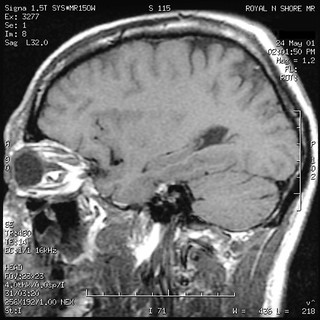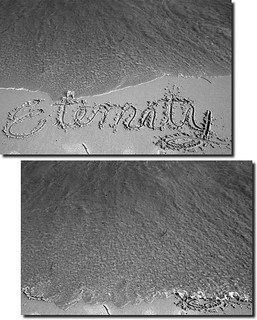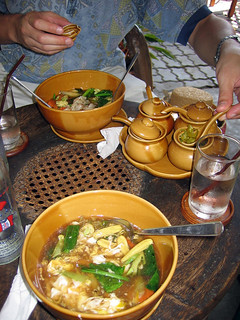

| Archive Blog Cast Forum RSS Books! Poll Results About Search Fan Art Podcast More Stuff Random |
|
Classic comic reruns every day
|
1 {photo of the Pyramid of Menkaure in Giza}
1 Caption: Photographic Memory
|
First (1) | Previous (3290) | Next (3292) || Latest Rerun (2895) |
Latest New (5380) First 5 | Previous 5 | Next 5 | Latest 5 Annotations theme: First | Previous | Next | Latest || First 5 | Previous 5 | Next 5 | Latest 5 This strip's permanent URL: http://www.irregularwebcomic.net/3291.html
Annotations off: turn on
Annotations on: turn off
|
 MRI scan of a human brain. |
We're still not sure of all of the details of how memory works on a physical and neurological level, and that's not really what I want to go into here. The current best model, as I understand it, is that long-term memories are stored in the physical wiring of neurons in the brain. This obviously takes some time to set up, as cells have to physically connect or disconnect to achieve the reworking of the neuronal circuitry. As an analogy, this is sort of like writing data to a computer hard drive, where physical magnetic elements of the drive are being modified into patterns that represent and store the data.
Short term memory is more dynamic. Since it clearly takes time to rewrite neurons, there must be some other mechanism for remembering things immediately, in the time before it can get recorded in that way. Our thoughts are likely to be essentially electrical impulses, routed through complex neural networks in the brain, and this capability provides a dynamic storage space where things can be remembered. Electrical impulses take virtually no time to set up, so can record things in real time, so to speak. Extending our analogy, this is like writing data to a computer's RAM, a series of circuits which store electrical states as long as they are provided with power.
At some point, our brain goes through a process of deciding which parts of this short term memory storage to write into longer term memory. It (normally) can't record everything. It tends to pick things we've repeated or studied, as well as new and unusual experiences, and discards many of the routine things that we don't care about very much. This is why you probably don't remember what you had for dinner on Wednesday two weeks ago, but you can remember much of the movie you saw in the cinema two years ago. It seems that much of this process of sorting through recent events and choosing some to remember for longer happens in our brains while we are asleep, and may be connected to dreaming.
 Memory is like writing in the sand. |
Memory can be a fickle thing. Frequently you can find that you remember the oddest pieces of unimportant trivia - stuff that you wouldn't even care about forgetting if you had any conscious choice in the matter[1] - while in other cases you can't recall the details of something important that you really want to remember. If only we could control our memory in the same way we control our computing devices, choosing what to save and what to delete, or even backing up everything in case we need it later. But we can't.
Maybe that's actually a good thing. Our psychologies would presumably be quite different if we could remember everything we wanted to, and maybe not for the best. A very few people have unusual brain chemistry or injuries which make them remember pretty much almost everything they experience. While some live otherwise normal lives, some of them are driven to distraction and express the unfulfilled desire to not have so much stuff recorded in their heads. So the human brain seems capable of remembering a lot more than it normally does with just a small and doable adjustment, yet it almost never does. The reason could either be that evolution has not yet come up with an inheritable mutation that unlocks this capability of our brains, or that remembering everything is actually detrimental to our survival and so has never propagated through the population.
Despite this, many of us often feel a yearning to be able to remember things more easily. Whether it be while studying for exams, or while trying to remember the details of that amusing incident when you were on vacation a few years ago, a better memory seems like it would be both valuable and emotionally fulfilling. But then some things are arguably better forgotten. The details of traumatic experiences or injuries can haunt people, and it becomes easier to live with such events over time as they recede into an ever hazier memory.
 What does this smell remind you of? |
Memories can be triggered by sensory stimuli. Smell is a particularly notorious sense for this. A tiny whiff of cut grass can bring memories of lazy summer afternoons spent playing outdoors as a child flooding back in abundance. Roses, pancakes, pine needles, antiseptic, wood smoke: you personally may not have specific memories associated with these smells, but I bet at least some of you do.
Smell is not the only memory-nudging sense. Photographs and even written words can trigger similar vivid recollections. I know they do for me. This is part of why I like to take photos, particularly when travelling.
Photography is part of my job as well, so I am doubly motivated to follow trends and public interactions with photography. I look at several photography blog, announcement, and discussion forum sites, and read stories about photography, photographic technology, and photographic issues in the news. One trend I've noticed in the last few years is the rising number of opinion pieces claiming that the growth in photography our culture is experiencing is ruining our lives. As cameras become more ubiquitous and more and more people can be seen snapping away, taking photos with their phones especially, many people think this is a sign of the ongoing deterioration of the human experience.
 The Mona Lisa, in the Louvre, Paris. |
The bitter resentment is almost palpable here. Just because someone is enjoying something in a different way to the way you enjoy it, doesn't mean they're not enjoying it. I bet the people holding up their phones throughout an entire concert are having a great time. It's true, they may be getting in other people's way, and that is certainly something to be discouraged, but just because they annoy you doesn't make them wrong-headed about what they themselves enjoy doing. They may very well be ruining your experience, but what the hell gives you the authority to claim they're ruining their own experience?
When I attend events or exhibitions, I play by the rules of the establishment. I determine if photography is allowed, and take the time to ask an employee if I am unsure. If they say no photography is allowed, I put away my camera. If they say it is allowed (or, in the memorable case when I visited the California Academy of Sciences in San Francisco in February and asked an elderly volunteer guide, "Is photography allowed?" and he impishly replied, "No! It's compulsory!!"), then I eagerly keep my camera handy and snap pictures of things that interest me.
Am I ruining my own experience? On the contrary. I will wander around and look at things. I'll stand back and appreciate something for a minute. I'll consider it from different angles. Then I'll snap a photo and move on. Or I'll take a photo of a bird or other animal as I see it and the opportunity presents itself. Then I'll stop and watch its behaviour for a few minutes, maybe taking another shot or two in the meantime. Visiting a foreign city, I'll wander the streets, absorb the local culture and atmosphere, and stop every now and then to photograph something I find visually interesting or which becomes significant because I interacted with it in some way (for example, a shop where I buy my lunch, or the meal itself).
 The meal I had in Chiang Mai. Actually, it looks like my wife took this photo. |
I know that one of the most delicious meals I have ever had was in Bangkok. My wife and I had just been across the Chao Phraya river to see the temple of Wat Arun, and returned by one of the many boats that ply across the river. It was lunchtime and we were hungry, so stopped in at a small hole-in-the-wall food establishment right near the wharf. I distinctly remember that what I ate there was incredibly good, but I cannot for the life of me remember what it was that I ate. I had neglected to take a photo of the food when it arrived at our table. On the same trip a few days earlier, when we'd first set out to explore the inland city of Chiang Mai, we had a similar experience, stopping at a tiny place run by a local family to get lunch. This meal was also incredibly good, and I took the few seconds to take a photo of it before digging in. And to this day I can remember exactly what it was that I ate there, because the photo reminds me.
And this is part of why I take lots of photos when I travel or visit someplace interesting. The purposes of my photography are many. Some of the photos I take are intended to be artistically composed, with the goal of being something to show off as artistic photography, or to frame and hang on my wall at home. Some of the photos are records of where I went and what I did, as an augmentation of my memory. When I was ten years old, my mother took me on a trip to Egypt. My memory of the trip now is patchy. I remember seeing the Pyramids of Giza, and just a few other things. Much of what I remember of that trip is based around the photos I took while there. I had a very simple Kodak "Brownie" camera (actually a Brownie branded Kodak Pocket A-1) and only took about 30 photos on the entire trip. I wish I had taken many more.
Another thing I do to boost my memory of trips is to keep a travel diary. I started this with a couple of trips I took to the USA while studying at university, writing them by hand in small notebooks. I have continued this habit ever since. Beginning essentially with my wife and my first overseas trip together, to New Zealand in 1997, I have transcribed each handwritten diary on to my personal web site. Beginning with our trip to Europe in 2012, I upgraded to typing my diaries directly into an iPad - which saves a lot of transcription time back home, let me tell you! Together with the photos I take, these diaries are marvellous tools for jogging the memory. My wife and I occasionally read through them, reminding ourselves of the various little incidents and things we've seen while travelling together. Some of them we would have completely forgotten about, without the photos and diaries, as we often read something and say, "Oh yeah! I remember that now! I'd forgotten that happened!"
So, the slipperiness and fickleness of memory can be a frustrating thing. But I'm doing my best to fight it and bolster the experiences of my life. That's why I take lots of photos. I do my best not to get in people's way when I do, but at any rate, don't rag on me for "ruining my own experience of life". That's not what I'm doing at all. Far from it.
|
LEGO® is a registered trademark of the LEGO Group of companies,
which does not sponsor, authorise, or endorse this site. This material is presented in accordance with the LEGO® Fair Play Guidelines. |